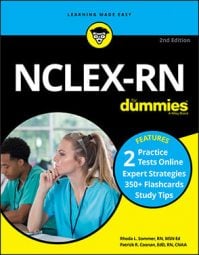Each of these categories and subcategories is classified as a “client need.” The idea is that all your patients’ needs fit into one of the categories listed in the following sections, whether it’s a need for pain medication or a need for a chocolate milkshake. Understanding the categories gives you a good idea of how this test is constructed and what areas questions come from. You definitely will see questions from each of these general areas on the exam.
As if categories and subcategories weren’t enough, the following processes are integrated throughout:
- Caring
- Communication
- Documentation
- Teaching
 © Tyler Olson / Shutterstock.com
© Tyler Olson / Shutterstock.comNot sure what to focus on? On the content side, the four categories and their subcategories comprise certain percentages of questions addressing each topic on the exam. They’re all pretty close percentage-wise, but a few sections are a bit more heavily weighted, so you may want to spend more time reviewing them. The breakdown appears in the following table.
| Client Need | Category | Percentage of Test |
| Safe and effective care | Management of care | 17–23% |
| Safe and effective care | Safety and infection control | 9–15% |
| Health promotion and maintenance | N/A | 6–12% |
| Psychosocial integrity | N/A | 6–12% |
| Physiological integrity | Basic care and comfort | 6–12% |
| Physiological integrity | Pharmacological and parenteral therapy | 12–18% |
| Physiological integrity | Reduction of risk potential | 9–15% |
| Physiological integrity | Physiological adaptation | 11–17% |
Client need #1: Safe and effective care
The first client need, safe and effective care, includes nursing care that addresses anything that falls under management of care and safety and infection control.Management of care covers
- Advance directives/self-determination and life planning
- Advocacy
- Assignment, delegations, and supervision
- Case management
- Client rights
- Collaboration with the multidisciplinary team
- Concepts of management
- Confidentiality/information security
- Continuity of care
- Establishing priorities
- Ethical practice
- Informed consent
- Information technology
- Legal rights and responsibilities
- Performance improvement
- Referrals
- Accident prevention/error/injury prevention
- Emergency response plan
- Ergonomic principles
- Handling hazardous and infectious materials
- Home safety
- Reporting of the incident event/irregular occurrence/variance
- Safe use of equipment
- Security plan
- Standard precautions/transmission-based precautions/surgical asepsis
- Use of restraints and safety devices
Practice question
The nurse is making an assignment for the nursing assistant who has been floated to the unit for the shift. Which of the following assignments would be appropriate for a nursing assistant?(1) A 62-year-old with a fractured hip, four days post-op
(2) A 75-year-old admitted three hours ago with intermittent chest pain
(3) A 49-year-old, one day post-op bowel resection, NPO with a nasogastric tube
(4) A 50-year-old who is being discharged
The correct answer is Choice (1). Keywords are assignment, for nursing assistant, floated, and appropriate assignment. What do you remember about delegation? What are the rules of how to delegate patient assignments? The nursing assistant can perform all activities of daily living, which include bathing, feeding, mobilizing, toileting, and basic comfort. The LPN can provide all the activities of daily living as well as skills that require sterile techniques, medication administration, invasive procedures, and treatments. The RN can do all the activities of daily living, all the skills, and all the assessments and teaching. Knowing about delegation makes it really easy to determine the correct answer. The nursing assistant can’t be assigned any patient who requires skilled care, assessment, or teaching. Therefore, the most appropriate patient to assign to the nursing assistant is the most stable patient who doesn’t need any medications, assessment, treatments, or teaching.Any patient who’s being admitted or discharged must always be assigned to the RN.
Client need #2: Health promotion and maintenance
The second client need, health promotion and maintenance, includes all things pertaining to the health in a person’s life — prevention and care out of the hospital and all things concerning a normal pregnancy and delivery, among other things.Health promotion and maintenance covers
- Aging process
- Ante/intra/postpartum and newborn care
- Developmental stages and transitions
- Health promotion/disease prevention
- Health screening
- Family Planning
- High-risk behaviors
- Human sexuality
- Immunizations
- Lifestyle choices
- Principles of teaching and learning
- Self-care
- Techniques of physical assessment
Practice question
The mother of a 2-month-old brings her baby to the well-baby clinic for his first health assessment. Which of the following would be appropriate anticipatory guidance for the nurse to present to the mother?(1) “Start using your car seat as soon as he can hold his head steady.”
(2) “Begin adding cereal to his formula.”
(3) “Expect him to begin to go for longer periods in between feedings.”
(4) “Consider taking him to play groups for additional stimulation.”
The correct answer is Choice (3). The keywords here are 2-month-old, well baby clinic, first health assessment, and appropriate anticipatory guidance for mother. By 2 months of age, babies’ stomachs have grown enough to accommodate larger feedings, which allow them to go for longer stretches before needing refueling. A 2-month-old should already be using a car seat. Cereal isn’t added until the child is at least 4 months old (around the same time that teeth erupt), and a 2-month-old is only interested in his primary caregivers.Client need #3: Psychosocial integrity
The psychosocial integrity category tests your knowledge of culture, health practices, mental health disorders, addictions, crisis theory, and the foundations of mental health nursing. This section is all about feelings and emotions and how to get the client to express them to be therapeutic.Psychosocial integrity covers
- Abuse/neglect
- Behavioral interventions
- Coping mechanisms
- Crisis intervention
- Cultural awareness/cultural influences on health
- End of life care
- Family dynamics
- Grief and loss
- Mental health concepts
- Religious and spiritual influences on health
- Sensory/perceptual alterations
- Stress management
- Substance use and dependencies
- Support systems
- Therapeutic communications
- Therapeutic environment
Practice question
A nurse is providing information to the family of an alcoholic patient. The nurse encourages the wife of the patient to attend an Al-Anon support group. The wife states that it’s difficult for her to face other people because she is embarrassed by her husband’s behavior. What would the nurse most appropriately tell a wife to help alleviate some of her concern?(1) She doesn’t need to tell anybody her name or other identifying information.
(2) She won’t know any members of the support group.
(3) The members of the group have all experienced the same problem.
(4) The group is always led by a nurse, physician, or other healthcare provider.
The correct answer is Choice (3). Keywords to look at are wife of alcoholic patient, attending Al-Anon meetings, embarrassed by husband’s behavior, and most appropriate to alleviate some of her concerns. This question relates to supporting the client’s wife during an embarrassing event. Al-Anon is a support group for spouses and friends of alcoholics or addicts of any kind. Support groups are based on the premise that people who have experienced a problem are able to help others with the same problem. Choice (2) is wrong because the nurse can’t be sure that the spouse won’t know anybody in the group. Although Choice (1) may be correct, it’s not the most appropriate response to give to the wife of this patient. Choice (4) is incorrect because, although a nurse or other healthcare professional may be asked to speak at a group meeting, the members of the support group usually lead it themselves.Client need #4: Physiological integrity
The last client need, physiological integrity, includes four different subcategory client needs: basic care and comfort, pharmacological and parenteral therapies, reduction of risk potential, and physiological adaptation. Basic care and comfort addresses the knowledge, skills, and ability required to provide comfort and assistance to the client in the performance of activities of daily living. Pharmacological and parenteral therapies address the knowledge, skills, and ability required to administer medication and other intravenous therapies. Reduction of risk potential addresses the knowledge, skills, and ability required to prevent complications or health problems related to the client’s condition or any other prescribed treatment or procedures. Physiological adaptation addresses the ability to provide care to clients with acute, chronic, or life-threatening conditions.In the category of physiological integrity, you’ll encounter questions from the following subcategories:
- Basic care and comfort covers
- Assistive devices
- Elimination
- Mobility/immobility
- Non-pharmacological comfort interventions
- Nutrition and oral hydration
- Personal hygiene
- Rest and sleep
- Pharmacological and parenteral therapies covers
- Adverse effects/contraindications and side effects
- Blood and blood products
- Central venous access devices
- Dosage calculation
- Expected outcomes/effects
- Intravenous therapy
- Medication administration
- Parenteral/intravenous fluids
- Pharmacological pain management
- Total parenteral nutrition
- Reduction of risk potential covers
- Changes/abnormalities in vital signs
- Diagnostic tests
- Laboratory values
- Monitoring conscious sedation
- Potential for alterations in body systems
- Potential for complications of diagnostic tests/treatments/procedures
- Potential for complications from surgical procedures and health alterations
- System specific assessments
- Therapeutic procedures
- Physiological adaptation covers
- Alterations in body systems
- Fluid and electrolyte imbalances
- Hemodynamics
- Illness management
- Medical emergencies
- Pathophysiology
- Unexpected response to therapies
Practice question
Which of the following would the nurse expect to be interventions for a client with acute kidney disease? Select all that apply(1) I & 0 every two hours for color and characteristics
(2) Sodium bicarbonate to be used if acidosis occurs
(3) Monitor for wheezing, rhonchi, and edema, which is an indication of fluid retention and overload
(4) Daily weight
(5) Monitor urinalysis for hematuria, casts, specific gravity, and glucose levels
The correct answers are Choices (2), (3), and (4). Keywords are nurse expect, interventions, and acute kidney disease. This question addresses the subcategory of physiological adaptation. Because it asks which interventions would be expected for acute kidney disease, Choice (1) is incorrect; it has the nurse monitoring I & 0 every two hours, when the monitoring should actually occur every hour. Choice (2) is correct because you’d monitor for acidosis and treat with sodium bicarbonate. Choice (3) is correct because wheezing, rhonchi, and edema are all signs of fluid overload. Choice (4) is correct because taking daily weights to check for weight gain — a sign of fluid overload if greater than 2 pounds in 24 hours — is appropriate for this condition. Choice (5) is incorrect. You’d monitor urinalysis for all but the glucose in acute kidney disease.
